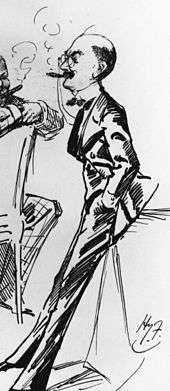Thomas Anstey Guthrie

Thomas Anstey Guthrie (8 August 1856 - 10 March 1934) was an English novelist and journalist, who wrote his comic novels under the pseudonym F. Anstey.
Early life and family
He was born in Kensington, London, to Augusta Amherst Austen, an organist and composer, and Thomas Anstey Guthrie. He was educated at King's College School and at Trinity Hall, Cambridge, and was called to the bar in 1880.[1]
Guthrie married and his younger brother was the physician Leonard Guthrie (1858-1918).[2][3]
Writing career
The popular success of his story Vice Versa (1882) with its topsy turvy substitution of a father for his schoolboy son, at once made his reputation as a humorist of an original type. In 1883, he published a serious novel, The Giant's Robe; but he discovered (and again in 1889 with The Pariah) that it was not as a serious novelist but as a humorist that the public insisted on regarding him. As such, his reputation was further confirmed by The Black Poodle (1884), The Tinted Venus (1885), A Fallen Idol (1886), and other works.
Guthrie became an important member of the staff of Punch magazine, in which his voces populi and his humorous parodies of a reciter's stock-piece (Burglar Bill, &c.) represent his best work. In 1901, his successful farce The Man from Blankleys, based on a story that originally appeared in Punch, was first produced at the Prince of Wales Theatre, in London. He wrote Only Toys (1903) and Salted Almonds (1906).[4]
Many of Anstey's stories have been adapted into theatrical productions and motion pictures. The Tinted Venus was adapted by S. J. Perelman, Ogden Nash, and Kurt Weill into One Touch of Venus in 1943. Vice Versa was adapted as a play in 1883 and has been filmed many times, usually transposed in setting and without any credit to the original book. Another of his novels, The Brass Bottle, has also been filmed more than once, including The Brass Bottle (1964). His Tourmalin's Time Cheques (1891) is one of the earliest stories featuring the science fiction concept of intentional and frequent movement in time, and probably the first to investigate the practical paradoxes such a concept would create.
Guthrie wrote an autobiography, under both his pen and true names, in 1936 entitled A Long Retrospect.[5]
Death
Guthrie died on 10 March 1934.
Selected publications
1880s
- Vice Versa (1882)
- The Black Poodle And Other Tales (1884)
- The Giant's Robe (1884)
- The Tinted Venus (1885)
- A Fallen Idol (1886)
- Burglar Bill And Other Pieces (1888)
- The Pariah (1889)
1890s
- Voces Populi (1890)
- Tourmalin's Time Cheques (1891)
- Mr. Punch's Model Music-Hall Songs And Dramas (1892)
- The Talking Horse And Other Tales (1892)
- The Travelling Companions (1892)
- The Man From Blankley's And Other Sketches (1893)
- Mr. Punch's Pocket Ibsen (1893)
- Under the Rose (1894)
- Lyre and Lancet (1895)
- The Statement of Stella Maberly, Written By Herself (1896)
- Baboo Jabberjee, B. A. (1897)
- Puppets At Large (1897)
- Love Among The Lions (1898)
- Paleface And Redskin (1898)
1900s
- The Brass Bottle (1900)
- A Bayard From Bengal (1902)
- Only Toys! (1903)
- Salted Almonds (1906)
- Winnie, An Everyday Story (1909)
Later
- In Brief Authority (1915)
- Percy and Others (1915)
- The Last Load (1925)
- The Would-Be Gentleman (Adapted From Molière's Le Bourgeois gentilhomme) (1927)
- The Imaginary Invalid (Adapted From Molière's Le Malade imaginaire) (1929)
- Humour and Fantasy (1931 - omnibus volume of short stories and four novels)
- A Long Retrospect (1936 - autobiography)
References
- ↑ "Guthrie, Thomas Anstey (GTRY875TA)". A Cambridge Alumni Database. University of Cambridge.
- ↑ GUTHRIE, Leonard George (1858-1918). AIM25. Retrieved 5 July 2018.
- ↑ " "A Kind of Odour of Salem House": David Copperfield and Thomas Anstey Guthrie" by Peter Merchant in Peter Merchant & Catherine Waters (Eds.) Dickens and the Imagined Child. Routledge. 2016. pp. 131-151 (p. 143). ISBN 978-1-4724-2381-8.
- ↑ New International Encyclopedia
- ↑ A Long Retrospect on the Internet Archive

External links
| Wikisource has original works written by or about: Thomas Anstey Guthrie |
| Wikiquote has quotations related to: Thomas Anstey Guthrie |
- Works by F. Anstey at Project Gutenberg
- Works by or about F. Anstey at Internet Archive
- Works by F. Anstey at LibriVox (public domain audiobooks)

- F. Anstey at the Internet Speculative Fiction Database
- Thomas Anstey Guthrie on IMDb
- National Portrait Gallery sketch and full caricature
- F. Anstey at Library of Congress Authorities, with 63 catalogue records